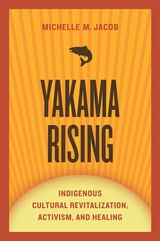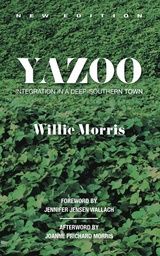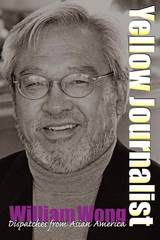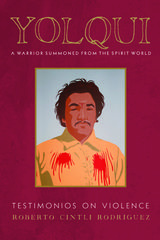1259 books about Race relations and 4
start with Y
1259 books about Race relations and 4
1259 books about Race relations
4 start with Y start with Y
4 start with Y start with Y

Yakama Rising
Indigenous Cultural Revitalization, Activism, and Healing
Michelle M. Jacob
University of Arizona Press, 2013
The Yakama Nation of present-day Washington State has responded to more than a century of historical trauma with a resurgence of grassroots activism and cultural revitalization. This pathbreaking ethnography shifts the conversation from one of victimhood to one of ongoing resistance and resilience as a means of healing the soul wounds of settler colonialism. Yakama Rising: Indigenous Cultural Revitalization, Activism, and Healing argues that Indigenous communities themselves have the answers to the persistent social problems they face. This book contributes to discourses of Indigenous social change by articulating a Yakama decolonizing praxis that advances the premise that grassroots activism and cultural revitalization are powerful examples of decolonization.
Michelle M. Jacob employs ethnographic case studies to demonstrate the tension between reclaiming traditional cultural practices and adapting to change. Through interviewees’ narratives, she carefully tacks back and forth between the atrocities of colonization and the remarkable actions of individuals committed to sustaining Yakama heritage. Focusing on three domains of Indigenous revitalization—dance, language, and foods—Jacob carefully elucidates the philosophy underlying and unifying each domain while also illustrating the importance of these practices for Indigenous self-determination, healing, and survival.
In the impassioned voice of a member of the Yakama Nation, Jacob presents a volume that is at once intimate and specific to her home community and that also advances theories of Indigenous decolonization, feminism, and cultural revitalization. Jacob’s theoretical and methodological contributions make this work valuable to a range of students, academics, tribal community members, and professionals, and an essential read for anyone interested in the ways that grassroots activism can transform individual lives, communities, and society.
Michelle M. Jacob employs ethnographic case studies to demonstrate the tension between reclaiming traditional cultural practices and adapting to change. Through interviewees’ narratives, she carefully tacks back and forth between the atrocities of colonization and the remarkable actions of individuals committed to sustaining Yakama heritage. Focusing on three domains of Indigenous revitalization—dance, language, and foods—Jacob carefully elucidates the philosophy underlying and unifying each domain while also illustrating the importance of these practices for Indigenous self-determination, healing, and survival.
In the impassioned voice of a member of the Yakama Nation, Jacob presents a volume that is at once intimate and specific to her home community and that also advances theories of Indigenous decolonization, feminism, and cultural revitalization. Jacob’s theoretical and methodological contributions make this work valuable to a range of students, academics, tribal community members, and professionals, and an essential read for anyone interested in the ways that grassroots activism can transform individual lives, communities, and society.
[more]

Yazoo
Integration in a Deep-Southern Town
Willie Morris
University of Arkansas Press, 2012
In 1970 Brown v. Board of Education was sixteen years old, and fifteen years had passed since the Brown II mandate that schools integrate "with all deliberate speed." Still, after all this time, it was necessary for the U.S. Supreme Court to order thirty Mississippi school districts--whose speed had been anything but deliberate--to integrate immediately. One of these districts included Yazoo City, the hometown of writer Willie Morris. Installed productively on "safe, sane Manhattan Island," Morris, though compelled to write about this pivotal moment, was reluctant to return to Yazoo and do no less than serve as cultural ambassador between the flawed Mississippi that he loved and a wider world. "I did not want to go back," Morris wrote. "I finally went home because the urge to be there during Yazoo's most critical moment was too elemental to resist, and because I would have been ashamed of myself if I had not." The result, Yazoo, is part reportage, part memoir, part ethnography, part social critique--and one of the richest accounts we have of a community's attempt to come to terms with the realities of seismic social change. As infinitely readable and nuanced as ever, Yazoo is available again, enhanced by an informative foreword by historian Jenifer Jensen Wallach and a warm and personal afterword on Morris's writing life by his widow, JoAnne Prichard Morris.
[more]

Yellow Journalist
Dispatches from Asian America
William Wong
Temple University Press, 2001
"For three decades, William Wong has been America's most energetic and entertaining chronicler of the Asian diaspora and its effects on politics, culture, business, sports, dress, diet, and language. Like other great humorists, he exposes the painful absurdities that plague each new wave of immigrant families as they enrich the national character, from Wong's own adventurous parents to Tiger Woods. Some of these pieces offer surprising insights on geopolitics and others explore the legal and social consequences of racial discrimination, but my favorites are the playful essays, including the classic 'So That's Why I Can't Lose Weight.' "
--Jay Mathews, Washington Post reporter and columnist, and author of Class Struggle
Who are Asian Americans? Are they the remnants of the "yellow peril" portrayed in the media through stories on Asian street gangs, unscrupulous political fundraisers, and crafty nuclear spies? Or are they the "model minority" that the media present as consistently outranking European Americans in math scores and violin performances?
In this funny, sobering, and always enlightening collection, journalist William Wong comments on these and other anomalies of the Asian American experience. From its opening tribute to the Oakland Chinatown of Wong's childhood to its closing tribute to Tiger Woods, Yellow Journalist portrays the many-sided legacies of exclusion and discrimination. The stories, columns, essays, and commentaries in this collection tackle such persistent problems as media racism, criminality, inter-ethnic tensions, and political marginalization. As a group, they make a strong case for the centrality of the Asian American historical experiences in U.S. race relations.
The essays cover many subjects, from the personal to policy, from the serious to the silly. You will learn a little Asian American history and a lot about the nuances and complexities of the contemporary Asian American experience. If there is an overriding theme of these stories and essays, it is the multi-faceted adaptation of ethnic Asians to the common American culture, the intriguing roles that they play in our society, and the quality of their achievements to contribute to a better society.
Bill Wong's high school journalism teacher took him aside during his senior year and told him he would have to be "twice as good" to succeed at his chosen profession. Succeed he did, and "twice as good" he is. As Darrell Hamamoto remarks in his Foreword, "'Chinaman,' Chinese American, Asian American; any way you slice it, Bill Wong is one straight-up righteous Yellow Man."
"One of the advantages of having a writer of Bill Wong's talent around is that we don't have to depend upon intermediaries and go-betweens to give us insights about issues affecting Asian-Americans. He is often entertaining, and ironic, but underneath it all is a serious mind devoted to shattering myths about one of our fastest growing minorities."
--Ishmael Reed, author of The Reed Reader
"It is about time that America meet William Wong--an icon in journalism whose experience as a second generation Chinese-American has given him a unique lens through which life in America can be examined. For almost two decades, his columns in the Oakland Tribune and other San Francisco bay area newspapers have captured a different kind of reality about some of our most important social, cultural, and political moments. Wong's readiness to share his family, his community, and his conscience allows readers to cross a bridge into the world of Asian America. Whether it is an analysis of the 1996 campaign finance scandals or a perspective on how parent pressures and bi-cultural conflicts can play out in a young Asian American teen's life, Wong's skillful weaving of humor, irony, and poignant portrayals of the circumstances make each story linger long past the final sentence of his essay."
--Angela E. Oh, Lecturer/Former Advisory Board Member, President's Initiative on Race
"...an anthology of Wong's best writing from the last decade and a half, covering an impressive array of topics and tone."
--Asianweek
[more]

Yolqui, a Warrior Summoned from the Spirit World
Testimonios on Violence
Roberto Cintli Rodríguez; Foreword by Patrisia Gonzales
University of Arizona Press, 2019
In Nahuatl yolqui is the idea of a warrior brought back from the dead. For author and activist Roberto Cintli Rodríquez, it describes his own experience one night in March 1979 after a brutal beating at the hands of L.A. sheriffs.
Framed by Rodríguez’s personal testimony of police violence, this book offers a historia profunda of the culture of extralegal violence against Red-Black-Brown communities in the United States. In addition to Rodríguez’s story, this book includes several short essays from victims and survivors that bring together personal accounts of police brutality and state-sponsored violence. This wide-ranging work touches on historical and current events, including the Watts rebellion, the Zoot Suit Riots, Operation Streamline, Standing Rock, and much more.
From the eyewitness accounts of Bartolomé de las Casas to the protestors and allies at Standing Rock, this book makes evident the links between colonial violence against Red-Black-Brown bodies to police violence in our communities today. Grounded in the stories of the lives of victims and survivors of police violence, Yolqui, a Warrior Summoned from the Spirit World illuminates the physical, spiritual, and epistemic depths and consequences of racialized dehumanization.
Rodríguez offers us an urgent, poignant, and personal call to end violence and the philosophies that permit such violence to flourish. Like the Nahuatl yolqui, this book is intended as a means of healing, offering a footprint going back to the origins of violence, and, more important, a way forward.
With contributions by Raúl Alcaraz-Ochoa, Citalli Álvarez, Tanya Alvarez, Rebekah Barber, Juvenal Caporale, David Cid, Arianna Martinez Reyna, Carlos Montes, Travis Morales, Simon Moya Smith, Cesar Noriega, Kimberly Phillips, Christian Ramirez, Michelle Rascon Canales, Carolyn Torres, Jerry Tello, Tara Trudell, and Laurie Valdez.
Framed by Rodríguez’s personal testimony of police violence, this book offers a historia profunda of the culture of extralegal violence against Red-Black-Brown communities in the United States. In addition to Rodríguez’s story, this book includes several short essays from victims and survivors that bring together personal accounts of police brutality and state-sponsored violence. This wide-ranging work touches on historical and current events, including the Watts rebellion, the Zoot Suit Riots, Operation Streamline, Standing Rock, and much more.
From the eyewitness accounts of Bartolomé de las Casas to the protestors and allies at Standing Rock, this book makes evident the links between colonial violence against Red-Black-Brown bodies to police violence in our communities today. Grounded in the stories of the lives of victims and survivors of police violence, Yolqui, a Warrior Summoned from the Spirit World illuminates the physical, spiritual, and epistemic depths and consequences of racialized dehumanization.
Rodríguez offers us an urgent, poignant, and personal call to end violence and the philosophies that permit such violence to flourish. Like the Nahuatl yolqui, this book is intended as a means of healing, offering a footprint going back to the origins of violence, and, more important, a way forward.
With contributions by Raúl Alcaraz-Ochoa, Citalli Álvarez, Tanya Alvarez, Rebekah Barber, Juvenal Caporale, David Cid, Arianna Martinez Reyna, Carlos Montes, Travis Morales, Simon Moya Smith, Cesar Noriega, Kimberly Phillips, Christian Ramirez, Michelle Rascon Canales, Carolyn Torres, Jerry Tello, Tara Trudell, and Laurie Valdez.
[more]
READERS
Browse our collection.
PUBLISHERS
See BiblioVault's publisher services.
STUDENT SERVICES
Files for college accessibility offices.
UChicago Accessibility Resources
home | accessibility | search | about | contact us
BiblioVault ® 2001 - 2024
The University of Chicago Press









